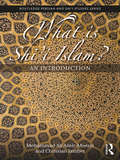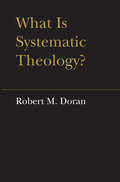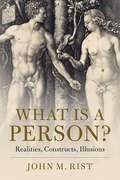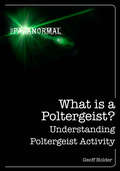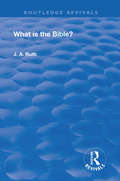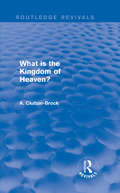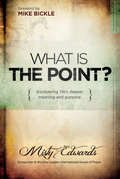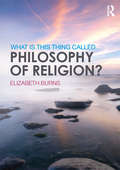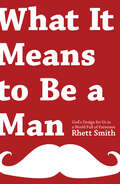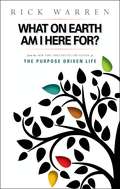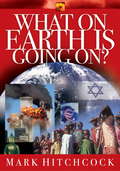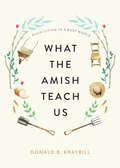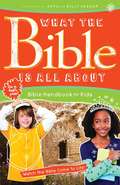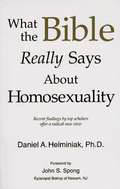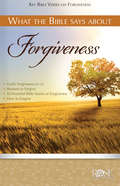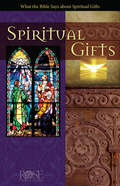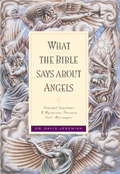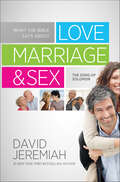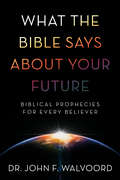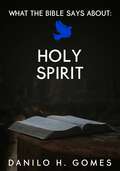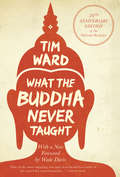- Table View
- List View
What is Shi'i Islam?: An Introduction (Routledge Persian and Shi'i Studies #3)
by Mohammad Ali Amir-Moezzi Christian Jambet<p>For the public at large Shi’ism often implies a host of confused representations, suggesting more often than not obscurantism, intolerance, political violence and other ignominies running hot or cold in response to world events. In fact for many people, Shi’ism stands for "radical Islam", or – worse – "Islamic terrorism". In some respects, nothing is more familiar than Shi’ism, and yet nothing is more misunderstood. For some twenty years the media have increased their coverage of the phenomenon. Never, or only rarely, do they formulate the question we ask here: what is Shi’ism? What is this belief that inspires millions of people dispersed throughout the world? <p>This book provides a broad based introduction to Shi’i Islam. It examines what the Shi’i believe, how they see themselves and how they view the world. It includes a thorough examination of doctrine, philosophy, the Shi’i approach to the Qur’an and the historical evolution of Shi’ism as a branch of Islam. Too often, and too quickly, the conclusion is drawn that Shi’ism is a marginal heretical sect, fundamentally alien to the deeper truth of the great religion of Islam, thrust by historical accident onto the political stage. Shi’ism either speaks the truth of Islam, meaning that it is a truth of terror, or it is entirely foreign to Islam and, therefore, merits outright rejection, as Islamic fundamentalists and some individuals repeatedly claim. This book intends to explain why such common misunderstandings of Shi’ism have taken root. <p>Written in an accessible format and providing a thorough overview of Shi’ism, this book will be an essential text for students and scholars of Islamic Studies or Iranian Studies.</p>
What is Systematic Theology?
by Robert Doran, S.J.In his classic work Method in Theology, Bernard Lonergan left many questions unanswered in regard to his treatment of systematics. In What Is Systematic Theology? Robert M. Doran attempts to articulate and respond to these questions. Doran begins by accepting four emphases presented by Lonergan concerning systematics: first, that its principal function is the hypothetical and analogical understanding of the mysteries of faith; second, that it should begin with those mysteries of faith that have received dogmatic status; third, that it must proceed in the 'order of teaching' rather than the 'order of discovery'; and last, that it must be explanatory rather than merely descriptive. He then addresses questions that are raised by each of these emphases. What Is Systematic Theology? is the most thorough attempt undertaken to date to advance Lonergan's program for systematics, fully in the spirit of his work but addressing issues that he left to others. Doran's idea of a core set of meanings for systematics – or a 'unified field structure' – is highly original, as is the integration of the systematic ideal and contemporary historical consciousness.
What is a Person?: Realities, Constructs, Illusions
by John M. RistIn this book, John M. Rist offers an account of the concept of 'person' as it has developed in the West, and how it has become alien in a post-Christian culture. He begins by identifying the 'Mainline Tradition' about persons as it evolved from the time of Plato to the High Middle Ages, then turns to successive attacks on it in the seventeenth and eighteenth centuries, then proceeds to the 'Five Ways' in which the Tradition was savaged or distorted in the nineteenth century and beyond. He concludes by considering whether ideas from contemporary philosophical movements, those that combine a closer analysis of human nature with a more traditional metaphysical background may enable the Tradition to be restored. A timely book on a theme of universal significance, Rist ponders whether we persons matter, and how we have reached a position where we are not sure whether we do.
What is a Poltergeist?: Understanding Poltergeist Activity (The Paranormal)
by Geoff HolderThe author of Poltergeist Over Scotland embarks on an in-depth study of the characteristics that imbue the paranormal world&’s &“noisy ghosts.&” What Is a Poltergeist? is an introduction to the mysterious phenomenon examining the theories and presenting the latest research evidence for poltergeist activity. In trying to define a poltergeist, author Geoff Holder ponders such questions as: Are they the restless souls of the dead? Demons? Witches&’ familiars? Household spirits? Mysterious earth energies? Unknown powers of the mind? Or hoaxes? This ebook takes the well-known poltergeist phenomena—the movement of objects by invisible forces, the noises, the eruptions of fire, water and electrical disturbance—and maps them against changing ideas and beliefs. The author presents the latest theories and research evidence in his search for answers.What is a Poltergeist? is part of The Paranormal, a series that resurrects rare titles, classic publications, and out-of-print texts, as well as publishes new supernatural and otherworldly ebooks for the digital age. The series includes a range of paranormal subjects from angels, fairies, and UFOs to near-death experiences, vampires, ghosts, and witchcraft.
What is the Bible? (Routledge Revivals)
by J.A. RuthFirst published in 1904, this volume questioned whether the Bible is in its entirety the literal Word of God. The author’s strong background in evangelical Christianity led them to question numerous theological experts and ministers on the topic and conclude that the Bible is as purely and entirely a human production as any other work of literature. Ruth argues instead that humanity’s knowledge of God has come about through developing the faculties with which God has endowed them and that the Bible is a history of humanity’s discovery of God. First considering whether the Bible can be considered the Word of God, the author moves on to cover topics including the evolution of Hebrew monotheism, the Bible canon, contraditions and miracles.
What is the Father Like? a Devotional Look at How God Cares for His Children
by W. Phillip Kellera beautiful devotional, written as a love letter from God to His children expressing His attributes.
What is the Kingdom of Heaven? (Routledge Revivals)
by A. Clutton-BrockWritten as the First World War was finally drawing to a close, A. Clutton-Brock’s reflections on the Kingdom of Heaven examine this challenging theological concept in light of the great religious, political and moral uncertainties thrown up by the conflict. In particular, Clutton-Brock contends that historically Christian orthodoxy has not sufficiently emphasised the role of the Kingdom in salvation, given its importance in the ministry and teaching of Christ. To preserve a religious vision capable of interacting with the modern, industrial world, Christian orthodoxy must carefully consider the scope and importance of political practice, the role of the individual in the realisation of the Kingdom, and the profound implications of reconciling the facts of the universe with the most sincerely held beliefs.
What is the Point?: Discovering Life's Deeper Meaning and Purpose
by Misty EdwardsEverybody lives. Everybody dies... So then, what IS the point? What is the purpose of life? It is the question all of us have--or will have eventually. It may be the most important question you can ask, because how you answer it determines everything about you. In What Is the Point?, Misty Edwards tackles the difficult questions of finding meaning in seasons of success and failure, smallness and greatness, pain and pleasure as we live lives that are, in the end, not of this world. To find the purpose of life, we must deal with eternity and come to real conclusions not only about ourselves but also about God. We have to get caught up in His story in order to see ours. This is what will make our lives worth living today.
What is this thing called Philosophy of Religion?
by Elizabeth BurnsWhat is this thing called Philosophy of Religion? grapples with the core topics studied on philosophy of religion undergraduate courses including: the meaning of religious language, including 20th century developments the nature of the Divine, including divine power, wisdom and action arguments for the existence of the Divine challenges to belief in the Divine, including the problems of evil, divine hiddenness and religious diversity believing without arguments arguments for life after death, including reincarnation. In addition to the in-depth coverage of the key themes within the subject area Elizabeth Burns explores the topics from the perspectives of the five main world religions, introducing students to the work of scholars from a variety of religious traditions and interpretations of belief. What is this thing called Philosophy of Religion? is the ideal introduction for those approaching the philosophy of religion for the first time, containing many helpful student-friendly features, such as a glossary of important terms, study questions and further reading.
What it Means to be a Man: God's Design for Us in a World Full of Extremes
by Rhett SmithWe hear the story of David and Goliath and wonder, &“Do we have what it takes to slay the giant?&”Men today are confronted with many different expectations of who they&’re supposed to be and what role they should be filling. By looking at history, the clichés of manhood, and what intimacy with God looks like, this short book will help men (and women) rethink what it means to be a man in today&’s culture.Counselor and pastor Rhett Smith works through tough questions like: How can men look up to role models without following their flaws?Is it possible to strike a balance between passivity and aggression? How can men speak up, find intimacy, and take care of others without neglecting themselves?When Christ calls us to follow Him, He paves a path that is different than our cultural expectations, a path that leads us to a relationship with Him and to true knowledge of what it means to be a man.
What it Means to be a Man: God's Design for Us in a World Full of Extremes
by Rhett SmithWe hear the story of David and Goliath and wonder, &“Do we have what it takes to slay the giant?&”Men today are confronted with many different expectations of who they&’re supposed to be and what role they should be filling. By looking at history, the clichés of manhood, and what intimacy with God looks like, this short book will help men (and women) rethink what it means to be a man in today&’s culture.Counselor and pastor Rhett Smith works through tough questions like: How can men look up to role models without following their flaws?Is it possible to strike a balance between passivity and aggression? How can men speak up, find intimacy, and take care of others without neglecting themselves?When Christ calls us to follow Him, He paves a path that is different than our cultural expectations, a path that leads us to a relationship with Him and to true knowledge of what it means to be a man.
What on Earth Am I Here For? Purpose Driven Life
by Rick WarrenAn evangelistic booklet based on the first three chapters of The Purpose Driven® Life.
What on Earth is Going on?
by Mark HitchcockAs sensationalists and skeptics wreak havoc with the country's emotions, prophecy expert Mark Hitchcock provides a much-needed definition of what is meant by "signs of the times. " Hitchcock discusses the current interest in prophecy caused by the 9/11 attack, presents Jesus' own forecast for the future of the world, and details five major global developments today that discernibly signal Christ's coming. This balanced, concise overview of the real signs of the times will clarify Christ's instructions challenging his followers to be alert in the final days. Readers will easily find and absorb the information they need to prepare for His return. From the Trade Paperback edition.
What the Amish Teach Us: Plain Living in a Busy World
by Donald B. KraybillWhat do the traditional plain-living Amish have to teach twenty-first-century Americans in our hyper-everything world? As it turns out, quite a lot!It sounds audacious, but it's true: the Amish have much to teach us. It may seem surreal to turn to one of America's most traditional groups for lessons about living in a hyper-tech world—especially a horse-driving people who resist "progress" by snubbing cars, public grid power, and high school education. Still, their wisdom confirms that even when they seem so far behind, they're out ahead of the rest of us. Having spent four decades researching Amish communities, Donald B. Kraybill is in a unique position to share important lessons from these fascinating Plain people. In this inspiring book, we learn intriguing truths about community, family, education, faith, forgiveness, aging, and death from real Amish men and women. The Amish are ahead of us, for example, in relying on apprenticeship education. They have also out-Ubered Uber for nearly a century, hiring cars owned and operated by their neighbors. Kraybill also explains how the Amish function in modern society by rejecting new developments that harm their community, accepting those that enhance it, and adapting others to fit their values. Pairing storytelling with informative and reflective passages, these twenty-two essays offer a critique of modern culture that is provocative yet practical. In a time when civil discourse is raw and coarse and our social fabric seems torn asunder, What the Amish Teach Us uproots our assumptions about progress and prods us to question why we do what we do.Essays include:1. Riddles: Negotiating with Modernity2. Villages: Webs of Well-Being3. Community: Taming the Big "I"4. Smallness: Bigness Ruins Everything5. Tolerance: A Light on a Hill6. Spirituality: A Back Road to Heaven7. Family: A Deep and Durable Bond8. Children: At Worship, Work, and Play9. Parenting: Raising Sturdy Children10. Education: The Way It Should Be11. Apprenticeship: An Old New Idea12. Technology: Taming the Beast13. Hacking: Creative Bypasses14. Entrepreneurs: Starting Stuff15. Patience: Slow Down and Listen16. Limits: Less Choice, More Joy17. Rituals: A Natural Detox18. Retirement: Aging in Place19. Forgiveness: Pathway to Healing20. Suffering: A Higher Plan21. Nonresistance: No Pushback22. Death: A Good Farewell
What the Bible Is All About: Bible Handbook for Kids
by Frances BlankenbakerWhat the Bible Is All About Handbook for Kids, based on Dr. Henrietta Mears' classic What the Bible is All About handbook, is a kid friendly, visually exciting resource designed to help children, tweens and younger teens. Children will read and understand Scripture's revelation of God and His great plan of the ages to save the world. Teachers and parents alike will appreciate this resource's appeal to young believers
What the Bible Really Says About Homosexuality
by Daniel A. HelminiakThe author considers each Scripture which is commonly held to condemn homosexuality--Genesis 19, Leviticus 18, 1 Timothy, 1 Corinthians, Romans, Matthew 5, 18. He then considers them in terms of historical and cultural understanding. Finally, he draws reasoned conclusions for today. Whether the reader agrees with the scholarship set forth in this book, the commentary is a must-read for every Christian and Jew. The book is easy to read even when considering the Greek and Hebrew language. The descriptions of the various methods of Bible interpretation are explained simply and clearly. Never does the author leave the reader wondering about his agenda; he is honest and straightforward about his background, his church work, and his understanding of the Scriptures he is studying. This book would make an excellent Bible study for anyone who is pondering the question of homosexuality in relation to faith practices.
What the Bible Says About Forgiveness
by Rose PublishingWhat the Bible Says About ForgivenessKey biblical principles about forgiveness. Answers questions including: What is forgiveness? Why do we need forgiveness? Why do we need to forgive others? Why is forgiving enemies tied to whether God will forgive us? 6 Ways to use this Forgiveness ebookFor --* personal use* discipleship* new believer's class* small group study or Sunday school class* divorce, addiction, and abuse recovery groups * "basics of the faith" course.Why buy?* Easy to read. Full-color, packed with fascinating charts and diagrams.*Attractive. Designed for the VISUAL learner.* Fast. This 14-page ebook is perfect for the busy person who doesn't have time to read long books.
What the Bible Says About Spiritual Gifts
by Rose PublishingThis best-selling Spiritual Gifts Pamphlet explains the spiritual gifts in the Bible and includes a Spiritual Gifts Quiz to help people know their gifts.This Spiritual Gifts booklet explains each of the gifts of the Holy Spirit and what they mean. When you became a Christian, the Holy Spirit gave you spiritual gifts to build up fellow believers, both in your own church and worldwide. This pamphlet defines spiritual gifts, and describes the differences between the biblical gifts. The Spiritual Gifts Test helps you identify your spiritual gifts, and explains how to use your gifts to benefit others. Each gift of the Spirit is vital and none is more important than others. No matter what your giftedness is, you play an important role in strengthening the church.Did You Know? 63% of Christians Don't Know Their Spiritual GiftsA recent Barna study showed that nearly two-thirds of Christians don't know their spiritual gift(s), don't think they have a gift at all, or claim to have a gift that is not actually biblical.Most Christians know something about Spiritual Gifts, but many don't realize how important they are. Believers are given Spiritual Gifts to contribute to the growth of the church. Spiritual Gifts are important because Scripture says that the church needs all of the gifts working together to help build the Body of Christ. Every believer counts! This pamphlet includes a Spiritual Gifts Questionnaire to determine which gift(s) you might have.The Holy Spirit gives spiritual gifts to Christians to help build the life and ministry of the Church. Yet, a large number of Christians do not use or even recognize their spiritual gift. Rose Publishing's Spiritual Gifts pamphlet will help you learn how important Spiritual Gifts are and how to develop the gift(s) the Holy Spirit has given you. Topics in the Spiritual Gifts pamphlet include --* A self-test "Spiritual Gifts Questionnaire" to determine which gift or gifts you may have.* Description of each gift and how to develop it more as you minister to other believers.Use for* Individual study* Discipleship* Small Group or Sunday School class* Christian School* Homeschoolers* New Believers' class* Church libraryStudy Questions for Personal Use or Small Groups:* Read pages 2-4: Based on page 2, what are the purposes of the gifts? These days many churches have paid staff; so why would the God give each believer a gift for the church? Why are these gifts important to all believers?* See page 3: Some gifts are very dramatic and visible and others are quiet and don't attract much attention. What is the main purpose of these gifts? Why do people need to be involved with other Christians, rather than becoming isolated? Scripture says we must appreciate each person's gift even if it is not very showy. How might you recognize the gifts that other believers have?* See page 4 and the 8 biblical ways that Holy Spirit works in our lives: The Holy Spirit is actively at work in the church with the purpose of glorifying Christ and helping the body of Christ (believers in the church) become more mature. Look at the list: Pick two ways the Holy Spirit acts and why they are important to the church. What would happen if these did not happen? How might you help carry out these priorities in your church?* Read all of page 5 and then go back to the first paragraph. If the Holy Spirit provides the life to the body, how do the members "keep it moving"? Later in the Spiritual Gifts pamphlet, each gift will be described, but based on these four lists of spiritual gifts from Scripture, why do you think such a wide variety of gifts is given to the church? Pick any two gifts and tell how (in your opinion) they fit into the Holy Spirit's priorities on page 4.* Read page 6-7: Christians in every type of church agree on what the spiritual gifts are, but not all Christians agree on precisely how and when they are to be used. Look at Paul's warning at the bottom of page 6 (taken from 2 Corinthians 12:12-26) about not being arrogant but showing concern for each member of the body (each person) so that the
What the Bible Says about Angels
by Dr David JeremiahResponding to the wide-spread, modern cultural interest in-even obsession with-the agents of heaven and their role in our world, popular Bible teacher David Jeremiah provides an in-depth, biblical look at the hot topic of angels, giving a broad and thorough survey of Scriptural teaching illustrated by powerful quotes from prominent teachers Billy Graham, Corrie ten Boom, C.S. Lewis, and others.
What the Bible Says about Love Marriage & Sex: The Song of Solomon
by David JeremiahWith roughly a third of all marriages ending in divorce, there's never been a better time for this refresher course in the true meaning of a successful union. As New York Times bestselling author Dr. David Jeremiah reminds us, it's a biblical truth: Sex and passionate, romantic love are God's ideas!Nothing rivals the beauty of the writing in the Song of Solomon -- and nothing rivals the wisdom of Solomon on matters of love, romance, marriage, and sexual intimacy. Dr. Jeremiah's thoughtful interpretation of Solomon and Shulamith's relationship provides all of us -- whether married or single -- with valuable lessons for a better, happier, more fulfilling life and a long, loving marriage.
What the Bible Says about Your Future: Biblical Prophecies for Every Believer
by John F. WalvoordFor readers of Tim LaHaye and John Hagee comes a thoughtful exploration of what happens in eternity. Relying on key biblical prophecies, renowned scholar Dr. John F. Walvoord explains what the Bible teaches about heaven and hell, how life on earth affects life in heaven, why God gives both judgment and grace, and how Christians can find comfort amid earthly suffering. What the Bible Says About Your Future opens a door for God to speak to readers’ hearts and minds about their heavenly future. Here they will find hope in knowing that God cares deeply about them—now and forever.
What the Bible is All About Bible Handbook
by Henrietta C. MearsIn clear, concise language, it gives you an excellent overview and understading of every book in the Bible--and makes it come alive as never before...
What the Bible says about: Holy Spirit
by Danilo H. GomesCollection: What the Bible Says About… If this is your first contact with this collection, I welcome you first of all! May God speak deeply to you as you go through each page. May the Holy Spirit amplify even more the reach of your spiritual eyes. This collection consists of the elucidation of certain subjects based on the Holy Bible. Currently, the Church of Jesus is partially divided into ideas. We all classify ourselves as Christians, but I notice that unity of faith is still lacking. So Christ himself gave the apostles, the prophets, the evangelists, the pastors and teachers, to equip his people for works of service, so that the body of Christ may be built up until we all reach unity in the faith and in the knowledge of the Son of God and become mature, attaining to the whole measure of the fullness of Christ. Ephesians 4:11-13 (Added emphasis) It was for this reason that the need to clarify some points based on what the Scriptures says, far from any exclusive or "special" human interpretation. The Bible is the complete and sufficient revelation of the gospel for man, so any inclusion by the human being is secondary and must be invalidated if it proves to be heretical. And if anyone takes words away from this scroll of prophecy, God will take away from that person any share in the tree of life and in the Holy City, which are described in this scroll. Revelation 22:19 All Scripture is God-breathed and is useful for teaching, rebuking, correcting and training in righteousness, so that the servant of God may be thoroughly equipped for every good work. 2 Timothy 3:16, 17 Feel free to check out each of the topics of this work in your own Bible. With your own eyes discover the truths revealed by the Lord and renew your way of thinking. Happy studying! Keep this Book of the Law always on your lips; meditate on it day and night, so that you may be careful to do everything w
What the Buddha Never Taught: 20th Anniversary Edition of the National Bestseller
by Wade Davis Tim WardThe 20th Anniversary Edition of the bestselling classic with a new foreword by Wade Davis. "Tim’s journeys took him not only to Asia, but into an inner world of spirit and faith. He has lived on the streets of India, pursued the Dharma in Himalayan monasteries, and joined the community of monks at Wat Pah Nanachat in the jungles of Thailand – a commitment detailed with such humour, honesty and grace in What the Buddha Never Taught". – Wade Davis, author of The Wayfinders, from the new foreword. There is a place in the jungles of northeastern Thailand where Westerners can live according to the monastic rules laid down over 2,500 years ago by the Buddha. Author and journalist Tim Ward sought enlightenment and spent a season in this unique Buddhist monastery-one of the strictest in Southeast Asia. His affectionate "behind the robes" book about the rigors and foibles of monastic life at Wat Pah Nanchat has become a modern Buddhist classic. How does a monk handle coming face to face with a cobra coiled behind a toilet door? Can Mr. Chicago - a former real estate tycoon - really find liberation in a 10" X 10" wooden hut? How does a would-be-monk manage to meditate with the incessant clouds of mosquitoes hovering overhead, when the precepts prohibit killing all sentient beings? And how do Tim and the others react when Thai villagers put a Mars Bar in their begging bowls? By turns humorous, iconoclastic and inspiring, What the Buddha Never Taught was a best seller in Canada, a Book of the month selection in the US, and has been translated into five languages, and used as a university text for classes in Asian and Religious studies.
What the Buddha Taught: Revised And (Oneworld Classics In Religious Studies)
by Walpola Rahula Paul DemiévilleThis indispensable volume is a lucid and faithful account of the Buddha’s teachings. "For years,” says the Journal of the Buddhist Society, "the newcomer to Buddhism has lacked a simple and reliable introduction to the complexities of the subject. Dr. Rahula’s What the Buddha Taught fills the need as only could be done by one having a firm grasp of the vast material to be sifted. It is a model of what a book should be that is addressed first of all to 'the educated and intelligent reader.’ Authoritative and clear, logical and sober, this study is as comprehensive as it is masterly.”This edition contains a selection of illustrative texts from the Suttas and the Dhammapada (specially translated by the author), sixteen illustrations, and a bibliography, glossary, and index.
